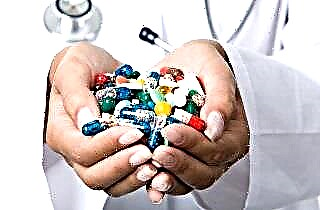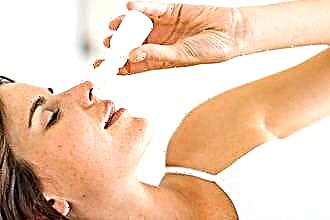According to medical statistics, sinusitis is one of the most common types of diseases. Acute sinusitis quite often appears against the background of improper ARVI treatment and is a type of complication. This ailment affects both children and adults alike.
Chronic sinusitis occupies a leading position among other diseases of the chronic type and occurs in 146 people out of 1000. It is estimated that up to 15 percent of adults and up to 5 percent of children suffer from some form of sinusitis.
The severity of sinusitis
 Before treating such a disease, it is necessary to determine its severity. Sinusitis can be presented in three forms:
Before treating such a disease, it is necessary to determine its severity. Sinusitis can be presented in three forms:
- With mild sinusitis, nasal congestion is observed, mucus is formed, which enters the oropharynx. In this case, the patient's body temperature may rise to subfebrile values (as a rule, no more than 37.5 degrees). Concomitant symptoms are the following: decreased sense of smell, recurrent headaches, general weakness.
- Moderate sinusitis is characterized by purulent nasal discharge. The body temperature is also increased (no more than 38 degrees). When palpating (feeling) the facial area of the sinuses, the patient notices painful sensations. As with a mild form, the acuity of smell may be reduced, there may be a headache radiating to the teeth of the upper jaw.
- Severe sinusitis is difficult to treat. The patient's body temperature exceeds subfebrile values (more than 38 degrees). In addition to severe nasal congestion, headaches and purulent discharge, complete loss of smell is diagnosed. In some cases, serious intracranial complications appear. It can be meningitis, osteomyelitis, polyps, and so on.
Treatment
The key task of the medical treatment course for sinusitis is to completely eliminate the foci of infection, which cause pathological changes in the paranasal sinuses. An antibiotic for sinusitis acts directly on the pathogen and reduces the risk of complications. As a rule, drugs of this type are prescribed for the treatment of acute forms of the disease or in case of relapse. Therefore, the course of admission should not be less than 14 days. As for the chronic form of sinusitis, in this case, antibiotic treatment is an additional tool.
 If antibiotic therapy is used, the medicine must be continued for another 7 days after the symptoms have resolved. This will ensure that the foci of infection are completely suppressed, and not a single pathogen remains in the body. Otherwise, relapse can be expected.
If antibiotic therapy is used, the medicine must be continued for another 7 days after the symptoms have resolved. This will ensure that the foci of infection are completely suppressed, and not a single pathogen remains in the body. Otherwise, relapse can be expected.
Antibiotics for sinusitis in adults may not improve the condition. If, after 4-5 days, a positive effect is not observed, an antibiotic of a different type or from a different group is prescribed. Everything will depend on resistance - the level of resistance of pathogenic microorganisms to the active substances of the drug.
To determine which antibiotic should be taken for sinusitis in each case, you need to consult an ENT doctor. You should not experiment with your own health and self-medicate.
Antibiotics are powerful drugs that have a powerful effect on the body. Therefore, their use must be justified.
Antibiotic groups
Antibiotics are natural or semi-synthetic drugs. They destroy microbes or significantly slow down their growth and reproduction. Their characteristics and type of exposure will depend entirely on their chemical structure. Depending on this, all antibacterial agents are divided into the following groups:
- Penicillins are most often used in the treatment of such types of sinusitis as frontal sinusitis and sinusitis. This is a very good type of antibiotic because it is highly selective. In other words, it acts locally only on the site of infection and does not affect the entire body. As a rule, for sinusitis, "Ampicillin", "Azlocillin" and "Amoxicillin" are prescribed. Such drugs destroy the cell walls of pathogenic bacteria and thus significantly reduce their activity.
 Cephalosporins in their chemical structure are very similar to the previous group. Their key advantage is the ability to fight bacteria that are insensitive to penicillins. Today, cephalosporins of three generations are actively used for sinusitis. The first generation is Cefazolin, the second is Cefalexin and the third is Ceftriaxone, Cefotaxime. For the most part, antibiotics of the first two generations are used to treat such an ailment.
Cephalosporins in their chemical structure are very similar to the previous group. Their key advantage is the ability to fight bacteria that are insensitive to penicillins. Today, cephalosporins of three generations are actively used for sinusitis. The first generation is Cefazolin, the second is Cefalexin and the third is Ceftriaxone, Cefotaxime. For the most part, antibiotics of the first two generations are used to treat such an ailment.- Macrolides are antibiotics that are also prescribed for sinusitis. They block bacterial structures that make proteins. As a result, viruses stop multiplying and die. Such drugs are safe for the body. Therefore, a characteristic feature of this group of drugs is the possibility of long-term use.
- Tetracyclines are similar in effect to macrolides, but have a lower selectivity. For this reason, their long-term use is not recommended, since they stop protein synthesis not only in the cells of viruses, but also in the cells of the body. Antibiotics of this group are usually not prescribed for the treatment of sinusitis. In some cases (as directed by a doctor), tetracycline ointment can be used to treat the nasal mucosa.
- Aminoglycosides and chloramphenicol have a fairly wide range of effects on the body. Their use is appropriate only when infectious pathological processes are detected simultaneously in several organs. These drugs are toxic and can have side effects such as kidney and liver damage. Therefore, they are not used for sinusitis.
Contraindications and side effects
 It is not always best to treat sinusitis with antibiotics. This applies to those cases when the disease is caused by a fungal or allergic pathogen. In addition, do not forget about contraindications.
It is not always best to treat sinusitis with antibiotics. This applies to those cases when the disease is caused by a fungal or allergic pathogen. In addition, do not forget about contraindications.
Take, for example, the first group that includes penicillins. If the patient has hypersensitivity to such substances or allergic diseases, they should not be used. In addition, they should be discarded when:
- monocytic sore throat;
- dysfunction of the kidneys and liver;
- intestinal pathologies of the chronic type;
- lymphocytic leukemia;
- breastfeeding.
Antibiotics should be avoided during pregnancy. This can harm the baby and negatively affect intrauterine development. For example, "Augmentin" and other penicillins should be used only after 3-4 months of pregnancy (second half) and only when absolutely necessary.
As far as the side effects of antibiotics are concerned, they are all well known. First of all, we are talking about the negative impact on the intestinal microflora. In addition, such drugs inhibit or completely destroy bacteria beneficial to the body. As a result, immunity is noticeably reduced.
Treating sinusitis with antibiotics can lead to the following side effects:
- candidiasis;
- headache;
- joint and muscle pain;
- nausea;
- diarrhea;
- vomit;
- dermatitis;
- violation of taste;
 changes in the composition of the blood and so on.
changes in the composition of the blood and so on.
Unlike penicillins, macrolide antibiotics have definitely fewer side effects. To preserve your body, do not hesitate to ask your doctor questions.
Read the instructions carefully, because the effectiveness of the treatment and your health depend on it. Take special care with antibiotics from the aminoglycoside group. These are very powerful drugs that can lead to multiple complications.
Possible mistakes
The wrong choice of a medicine is a typical mistake. This happens when the type of pathological pathogen and the spectrum of antibiotic exposure are not taken into account. For example, "Lincomycin" cannot be prescribed to fight sinusitis. Pathogenic bacteria are also insensitive to Gentamicin and Oxacillin. It is recommended to use "Ciprofloxacin" only for the treatment of complicated forms of sinusitis.
Another common mistake is the wrong way of administering the medicine into the body. Yes, and this, unfortunately, still happens today. If therapy is carried out on an outpatient basis (that is, outside the hospital), antibiotics for sinusitis should not be administered intramuscularly. Oral medication should be taken as a basis. In addition, it is necessary to switch to oral antibiotics as the patient's condition improves and sinusitis transforms into a less severe form (the so-called step therapy).
Choosing the wrong dose (less than normal in most cases) is a common mistake. In addition, the dosage regimen of the drug may be disrupted when the frequency of antibiotic use is not observed.
Don't forget to consider meal times as well. For example, "Azithromycin" and "Ampicillin" should be consumed immediately before meals (one hour).
When are antibiotics not needed?
 It should be noted that antibiotics are prescribed only for diseases of bacterial origin. If flu or cold viruses are the main cause of sinusitis, their use will be ineffective. In addition, you should stop taking such medications for fungal and allergic types of sinusitis. It should always be remembered that the wrong or unreasonable intake of antibiotics contributes to the deterioration of the clinical picture and leads to the appearance of complications. These drugs are not recommended for the following types of sinusitis:
It should be noted that antibiotics are prescribed only for diseases of bacterial origin. If flu or cold viruses are the main cause of sinusitis, their use will be ineffective. In addition, you should stop taking such medications for fungal and allergic types of sinusitis. It should always be remembered that the wrong or unreasonable intake of antibiotics contributes to the deterioration of the clinical picture and leads to the appearance of complications. These drugs are not recommended for the following types of sinusitis:
- viral sinusitis;
- sinusitis as a manifestation of allergies;
- chronic sinusitis (if caused by a fungal infection);
- mild sinusitis (ordinary inhalations and rinsing are quite enough).
In any case, we do not advise you to choose antibiotics for your sinusitis yourself. This is not a case where self-medication may be warranted. This ailment should be treated only under the guidance of a doctor. This approach will save you the risk of complications and help you quickly return to a full, healthy life.

 Cephalosporins in their chemical structure are very similar to the previous group. Their key advantage is the ability to fight bacteria that are insensitive to penicillins. Today, cephalosporins of three generations are actively used for sinusitis. The first generation is Cefazolin, the second is Cefalexin and the third is Ceftriaxone, Cefotaxime. For the most part, antibiotics of the first two generations are used to treat such an ailment.
Cephalosporins in their chemical structure are very similar to the previous group. Their key advantage is the ability to fight bacteria that are insensitive to penicillins. Today, cephalosporins of three generations are actively used for sinusitis. The first generation is Cefazolin, the second is Cefalexin and the third is Ceftriaxone, Cefotaxime. For the most part, antibiotics of the first two generations are used to treat such an ailment. changes in the composition of the blood and so on.
changes in the composition of the blood and so on.

